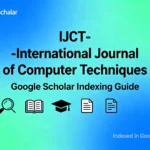
Computer Science Journals: Fast Publication & Peer Review Guide
Computer Science Journals: Publish Research That Transforms Technology
Submit AI, machine learning, algorithms, and systems research to peer-reviewed computer science journals with rapid 24-hour review, open access publishing, and permanent DOI indexing reaching 100M+ researchers worldwide
🚀 Submit Your Research PaperWhy Computer Science Journals Drive Innovation Forward
In an era where artificial intelligence reshapes industries monthly and quantum algorithms promise computational breakthroughs, computer science journals serve as accelerators translating academic discoveries into real-world technological advancement. The right publication venue determines whether your breakthrough neural network architecture influences industry adoption, your novel consensus protocol shapes distributed systems design, or your algorithmic optimization becomes foundational to future research.
Traditional academic publishing—where manuscripts spend 8-14 months navigating Byzantine review processes before reaching severely limited paywalled audiences—no longer matches the velocity of computational innovation. Modern computer science research publication demands immediacy, accessibility, and rigor simultaneously. Researchers developing transformer model improvements, edge computing protocols, or post-quantum cryptographic schemes cannot afford year-long publication delays that render contributions obsolete before appearing in print.
IJCT’s International Journal of Computer Techniques revolutionizes scholarly publishing through innovative systems combining conference-speed review (24 hours) with journal-quality depth, open access democratization with selective peer review maintaining standards, and permanent archival preservation with immediate global discovery. Whether your research advances theoretical complexity bounds, optimizes practical cloud architectures, or pioneers machine learning interpretability techniques, strategic computer science journal selection amplifies impact exponentially.

Modern computer science research requires publication venues matching technological evolution speed
Revolutionary Advantages of Modern Computer Science Journals
Publishing in peer-reviewed computer science journals provides measurable career and research impact advantages extending far beyond traditional citation metrics, encompassing discovery acceleration, collaboration facilitation, and industry technology transfer.
Lightning-Fast 24-Hour Peer Review
Revolutionary turnaround eliminating traditional 4-6 month delays through pre-committed specialist reviewer pools, structured evaluation rubrics, and editorial prescreening. Active researchers in neural networks review deep learning papers, distributed systems experts assess consensus protocols, algorithm theorists evaluate complexity proofs—ensuring domain-appropriate feedback within one day versus traditional journals’ glacial timelines rendering fast-moving research obsolete during review.
Discover fast publication process →100% Open Access Publication Model
Unrestricted free access for all readers globally—no subscription paywalls excluding researchers from developing nations, no institutional barriers preventing industry practitioner access, no payment requirements limiting student readership. Creative Commons licensing enables maximum reuse including commercial applications, educational purposes, translations, adaptations. Research demonstrates open access articles receive 35-50% more citations than paywalled equivalents while reaching 10x broader audiences including non-academic stakeholders who drive real-world technology adoption.
Explore open access benefits →Permanent DOI Assignment & Archiving
Every article receives Digital Object Identifier through CrossRef registration ensuring permanent web presence independent of URL changes, accurate citation tracking across Google Scholar/ResearchGate/academia platforms, seamless integration with reference managers (Zotero, Mendeley), and long-term preservation guaranteeing accessibility decades hence. DOIs prevent broken links degrading citation value while enabling standardized bibliographic metadata distribution to discovery services indexing scholarly literature globally for maximum findability.
Global Research Visibility & Indexing
Immediate Google Scholar indexing (servicing 100M+ monthly users worldwide), CrossRef metadata distribution enabling universal citation tracking, inclusion in institutional repositories and academic search engines maximizing discoverability. Open access removes geographic and economic barriers—Nigerian computer scientists, Indian AI researchers, Brazilian systems engineers access freely without institutional subscription requirements. Broader readership generates more citations, collaborations, and ultimately greater research impact transforming discoveries into technologies benefiting humanity globally.
Specialized Domain Expert Reviewers
Hyper-specialized reviewer matching ensures manuscripts evaluated by actively publishing researchers in narrow subfields rather than generalist editors lacking current domain knowledge. Deep learning specialists review transformer architectures, blockchain researchers assess consensus mechanisms, quantum computing experts evaluate algorithmic innovations, cybersecurity practitioners examine protocol vulnerabilities—resulting in constructive, technically sophisticated feedback identifying genuine contribution significance versus superficial assessments missing nuanced methodological advances distinguishing incremental from transformative work.
Understand peer review quality →Career Advancement & Professional Recognition
Peer-reviewed publications in respected computer science journals provide essential credentials for tenure evaluation, promotion decisions, fellowship applications, grant proposals, and job market competitiveness. Unlike unvetted preprints (arXiv, ResearchGate) lacking quality signaling, journal articles demonstrate research underwent systematic expert evaluation meeting community standards for methodological rigor, novelty, and significance. Rapid publication enables building publication records quickly—critical for early-career researchers facing tight tenure clocks or competitive job markets demanding demonstrated productivity through substantial publication portfolios.
📚 Explore Our Complete Computer Science Publishing Resource Hub
Navigate specialized guides covering every aspect of computer science research publication—from AI-focused venues and submission strategies to fast-track publishing and peer review navigation
AI & Machine Learning Journals
Specialized publication venues for neural networks, deep learning, natural language processing, computer vision, and reinforcement learning research targeting audiences actively engaged in AI advancement.
Explore AI Journals →Journal Submission Guide
Comprehensive step-by-step walkthrough covering manuscript preparation, formatting requirements, reviewer selection, cover letter composition, and revision strategies maximizing acceptance probability.
Read Submission Guide →Fast Publication Process
How 24-hour peer review maintains rigorous quality standards through pre-committed specialist reviewers, structured evaluation frameworks, and editorial prescreening systems accelerating publication 10x versus traditional timelines.
Discover Fast Track →Open Access Publishing
Understanding open access benefits, Creative Commons licensing, article processing charges, fee waiver programs, and strategies maximizing research impact through unrestricted global accessibility without paywalls.
Learn About OA →Peer Review Process Explained
Demystifying academic peer review workflows, reviewer evaluation criteria, responding to feedback strategically, handling rejection professionally, and navigating revision cycles successfully for eventual acceptance.
Master Peer Review →Comprehensive Coverage Across All Computer Science Disciplines
IJCT’s computer science journals welcome breakthrough research spanning theoretical foundations through applied systems—from proving NP-completeness bounds to deploying production-scale distributed architectures serving billions of users
🧠 Artificial Intelligence & Machine Learning
Neural network architectures (transformers, CNNs, RNNs, GANs), deep learning optimization techniques, computer vision algorithms (object detection, semantic segmentation, 3D reconstruction), natural language processing (language models, machine translation, sentiment analysis), reinforcement learning (policy gradients, Q-learning, multi-agent systems), meta-learning, few-shot learning, transfer learning, federated learning, explainable AI, fairness/bias mitigation, AI safety research, and emerging paradigms reshaping computational intelligence fundamentally.
Specialized venue available: For hyper-focused AI/ML research targeting neural network specialists and deep learning practitioners specifically, explore our dedicated artificial intelligence and machine learning journals with reviewers exclusively from AI research communities.
⚙️ Software Engineering & Systems
Software architecture patterns (microservices, event-driven, hexagonal, clean architecture), development methodologies (Agile, Scrum, DevOps, CI/CD pipelines), testing frameworks (unit, integration, end-to-end, property-based testing), code quality metrics and static analysis tools, refactoring techniques and technical debt management, containerization and orchestration (Docker, Kubernetes, service meshes), serverless computing paradigms, API design principles (REST, GraphQL, gRPC), database systems (SQL optimization, NoSQL patterns, distributed transactions), performance optimization strategies, and modern software development practices producing maintainable, scalable, production-grade systems.
🔐 Cybersecurity & Cryptography
Network security protocols and intrusion detection systems, encryption algorithms (symmetric, asymmetric, homomorphic), blockchain technology and consensus mechanisms (proof-of-work, proof-of-stake, Byzantine fault tolerance), zero-trust security architectures, threat modeling and vulnerability assessment methodologies, penetration testing frameworks and red team strategies, secure software development lifecycle practices, post-quantum cryptography resistant to quantum computing attacks, privacy-preserving computation techniques (secure multi-party computation, differential privacy), authentication and authorization systems, security incident response procedures, and defensive mechanisms protecting critical infrastructure against sophisticated adversaries exploiting zero-day vulnerabilities.
📊 Data Science & Analytics
Big data processing frameworks (Hadoop MapReduce, Apache Spark, Flink stream processing), statistical modeling and inference techniques, predictive analytics and forecasting methods, data visualization best practices and interactive dashboards, dimensionality reduction algorithms (PCA, t-SNE, UMAP), feature engineering and selection strategies, time series analysis and anomaly detection, recommendation systems (collaborative filtering, content-based, hybrid approaches), A/B testing and experimental design, causal inference from observational data, data mining algorithms discovering patterns in massive datasets, ETL pipelines and data warehousing architectures managing petabyte-scale information flows.
☁️ Cloud Computing & Distributed Systems
Distributed consensus algorithms (Paxos, Raft, Byzantine agreement protocols), fault-tolerant system design achieving high availability, load balancing strategies distributing traffic efficiently, auto-scaling mechanisms responding to demand fluctuations, distributed storage systems (Cassandra, DynamoDB, object stores), CAP theorem tradeoffs navigating consistency/availability/partition-tolerance constraints, edge computing pushing computation to network periphery, hybrid cloud architectures spanning public/private infrastructure, serverless function-as-a-service platforms, container orchestration at massive scale, distributed tracing for debugging complex microservice interactions, and system designs maintaining correctness guarantees despite partial failures inherent to distributed environments.
🔢 Algorithms & Computational Theory
Algorithm design paradigms (greedy, dynamic programming, divide-and-conquer), complexity theory advances (P vs NP, approximation algorithms, parameterized complexity), graph algorithms and network flows, randomized algorithms with probabilistic guarantees, online algorithms making decisions under uncertainty, parallel and distributed algorithmic techniques, quantum algorithms (Shor’s factoring, Grover’s search, variational quantum eigensolvers), streaming algorithms processing unbounded data with limited memory, algorithmic game theory analyzing strategic interactions, computational geometry solving spatial problems, and theoretical foundations of computation including automata theory, formal languages, computability limits, and lower bounds proving algorithmic impossibility results.

Computer science journals publish research spanning theoretical foundations to practical systems deployment
Streamlined Computer Science Journal Submission Process
Traditional computer science research publication involves Byzantine submission portals, opaque review workflows, and unpredictable timelines extending 12+ months. IJCT simplifies every step while maintaining rigorous peer review standards ensuring scholarly quality
Manuscript Preparation & Formatting
Flexible format acceptance: Submit manuscripts in DOCX, PDF, or LaTeX formats with standard academic structure including Abstract (200-300 words), Introduction (motivation, problem definition, contributions), Related Work (comprehensive literature review), Methodology (reproducible implementation details), Results (empirical evaluation with statistical rigor), Discussion (interpretation and limitations), Conclusions (summary and future directions), References (IEEE/ACM/APA styles accepted). Research articles typically 4,000-8,000 words; comprehensive surveys up to 12,000 words. Include high-resolution figures (300+ DPI), properly formatted algorithms with pseudocode, clearly labeled tables, and 5-7 keywords for indexing discoverability.
For detailed formatting requirements and manuscript preparation best practices, consult our comprehensive computer science journal submission guide walking through every preparation step systematically.
Online Portal Submission
Access IJCT’s intuitive submission system, create author account with institutional email (ORCID integration recommended), upload manuscript plus supplementary materials (code repositories, datasets, extended results), complete metadata fields (title, abstract, keywords, author affiliations), suggest 3-5 potential reviewers with expertise in your subdomain (excluding collaborators/conflicts), provide cover letter explaining contribution significance and journal fit, confirm ethical compliance (IRB approval, data availability, conflict disclosures), accept Creative Commons open access licensing terms, receive automatic confirmation email with manuscript tracking ID for status monitoring throughout review process.
24-Hour Expert Peer Review
Revolutionary rapid review maintaining quality through systematic innovation: Initial editorial screening (6 hours) verifies scope alignment, basic standards compliance, plagiarism check (>15% similarity triggers investigation), ethical documentation. Manuscripts passing screening assigned immediately to 2-3 specialist reviewers from pre-committed pools—active researchers in specific computer science subdomains agreeing to 24-hour turnarounds before assignment. Comprehensive double-blind evaluation assesses novelty (genuine contribution beyond incremental improvements), methodology (sound experimental design with appropriate baselines), reproducibility (sufficient implementation details), significance (impact on field advancement), clarity (well-structured presentation). Detailed feedback delivered within 24 hours with clear decision and improvement guidance.
Understand how we achieve conference-speed review without compromising rigor: Read our detailed explanation of the fast publication computer science process including reviewer management systems enabling rapid turnaround.
Strategic Revision & Resubmission
Address reviewer feedback systematically through point-by-point response documents explaining modifications addressing each concern or respectfully justifying why suggestions not implemented (with supporting citations/evidence). Highlight manuscript changes using track changes or color-coding enabling reviewers to verify revisions efficiently. Typical revision timelines: 7-14 days for minor corrections (clarifications, expanded related work, presentation polish), 4-6 weeks for major revisions requiring additional experiments or substantial methodology strengthening. Second review round (if needed) completed within 48 hours verifying concerns adequately addressed. Most manuscripts reach acceptance within 1-2 revision cycles when authors respond constructively to feedback.
Master the art of responding to peer review: Our peer review process guide provides strategic revision approaches transforming critical feedback into publication success.
Publication & Global Dissemination
Final acceptance notification with CrossRef DOI assignment ensuring permanent citation tracking, professional copyediting to IJCT house style maintaining consistency, author proofing stage verifying equations/figures/references correctness (final error-catching opportunity), immediate online publication with full open access availability (no embargo periods delaying access), automatic Google Scholar indexing submission (appears within 2-4 weeks reaching 100M+ monthly users), CrossRef metadata distribution enabling citation tracking across ResearchGate/academia/Mendeley platforms, ORCID profile updating linking publication to persistent author identifier, social media promotion through IJCT channels, email newsletter announcements to subscriber base, and long-term preservation in academic repositories guaranteeing accessibility decades hence despite technological changes.
Experience Publication Redefined for Modern Computer Science
From submission to publication in 2-3 weeks with expert peer review, permanent DOI assignment, and immediate global open access reaching millions
✍️ Submit Original ResearchUnwavering Quality Standards in Computer Science Publishing
Rapid publication without quality compromise requires multi-layered systematic processes ensuring every article published in computer science journals contributes meaningfully to computational science advancement through original, rigorous, and reproducible research
Rigorous Double-Blind Peer Review
Unbiased evaluation with complete bidirectional anonymization—manuscripts scrubbed of author-identifying information (names, affiliations, acknowledgments, self-citation patterns), reviewers identities concealed from authors throughout process. Eliminates institutional prestige bias where submissions from MIT/Stanford receive favorable treatment versus identical work from lesser-known institutions. Prevents personal relationship influence on assessment objectivity. Reviewers evaluate research merit exclusively—methodological soundness, novelty significance, presentation clarity—without contamination from author reputation or prior work familiarity affecting judgment.
Systematic Plagiarism Detection
All submissions undergo automated screening using Turnitin/iThenticate industry-standard software detecting copied text, paraphrased content without proper citation, self-plagiarism from authors’ prior publications. Similarity thresholds: >15% triggers editorial investigation verifying proper attribution versus problematic copying, >25% results automatic desk rejection without review. Protects research integrity ensuring published work represents genuine original contributions rather than repackaged existing content. Maintains scholarly trust essential for credible knowledge dissemination advancing collective understanding through cumulative validated discoveries.
Ethical Research Standards
Strict adherence to Committee on Publication Ethics (COPE) guidelines governing research conduct: IRB approval required for human subjects research, animal care committee approval for animal studies, explicit data availability statements enabling reproduction, authorship attribution requiring substantial intellectual contributions from all listed authors (not honorary authorship inflating publication counts), conflict of interest disclosures revealing funding sources/commercial affiliations/competing interests potentially biasing interpretation, protection against fabricated/falsified data through methodology transparency enabling independent verification, and responsible research practices upholding scientific integrity community norms.
Reproducibility Requirements
Strong emphasis on computational reproducibility addressing replication crisis affecting machine learning research particularly: code repository links (GitHub/GitLab) providing implementation access, trained model checkpoints enabling result verification without retraining, comprehensive hyperparameter specifications (learning rates, batch sizes, architectural choices, training procedures), dataset descriptions with access information (public repositories or detailed availability procedures for proprietary data), hardware environment specifications (GPU models, memory constraints), random seed reporting for stochastic algorithms, Docker containers capturing exact software dependencies—enabling independent researchers to validate claims through replication attempts.
Selective Acceptance Standards
Approximately 40% rejection rate demonstrates quality control maintaining scholarly standards rather than predatory “publish everything for fees” models degrading academic credibility. Accepted manuscripts demonstrate: genuine novelty advancing state-of-the-art beyond incremental parameter tuning, methodological rigor with appropriate experimental designs and statistical validation, reproducible results through detailed implementation descriptions, significant impact solving important problems or opening new research directions, clear presentation enabling understanding by computer scientists outside narrow specializations. Rejection doesn’t indicate poor research—often reflects scope mismatches or incomplete development better suited for revision/resubmission after strengthening.
Post-Publication Integrity
Clear procedures addressing issues emerging after publication: errata for minor errors (typos, incorrect figure labels) linked to original DOI, corrigenda for significant errors requiring correction notices (wrong equation, miscalculated results not affecting conclusions), retractions for fundamental flaws invalidating findings (fabricated data, major methodology errors), expressions of concern for ongoing investigations. Corrections maintain citation record through DOI linking while transparently acknowledging mistakes. Commitment to scientific integrity extends beyond initial publication—continuous quality assurance protecting readers and maintaining journal credibility long-term.
Publish Computer Science Research That Matters
Join thousands of researchers worldwide trusting IJCT for rapid 24-hour peer review, permanent DOI archiving, 100% open access publishing, and global visibility reaching 100M+ scholars through Google Scholar indexing and CrossRef distribution
International Journal of Computer Techniques (IJCT)
ISSN 2394-2231 | Peer Reviewed | Open Access | DOI Assignment | Google Scholar Indexed
24-Hour Review | Global Visibility | Permanent Archiving | CrossRef Registration
Email: editorijctjournal@gmail.com



